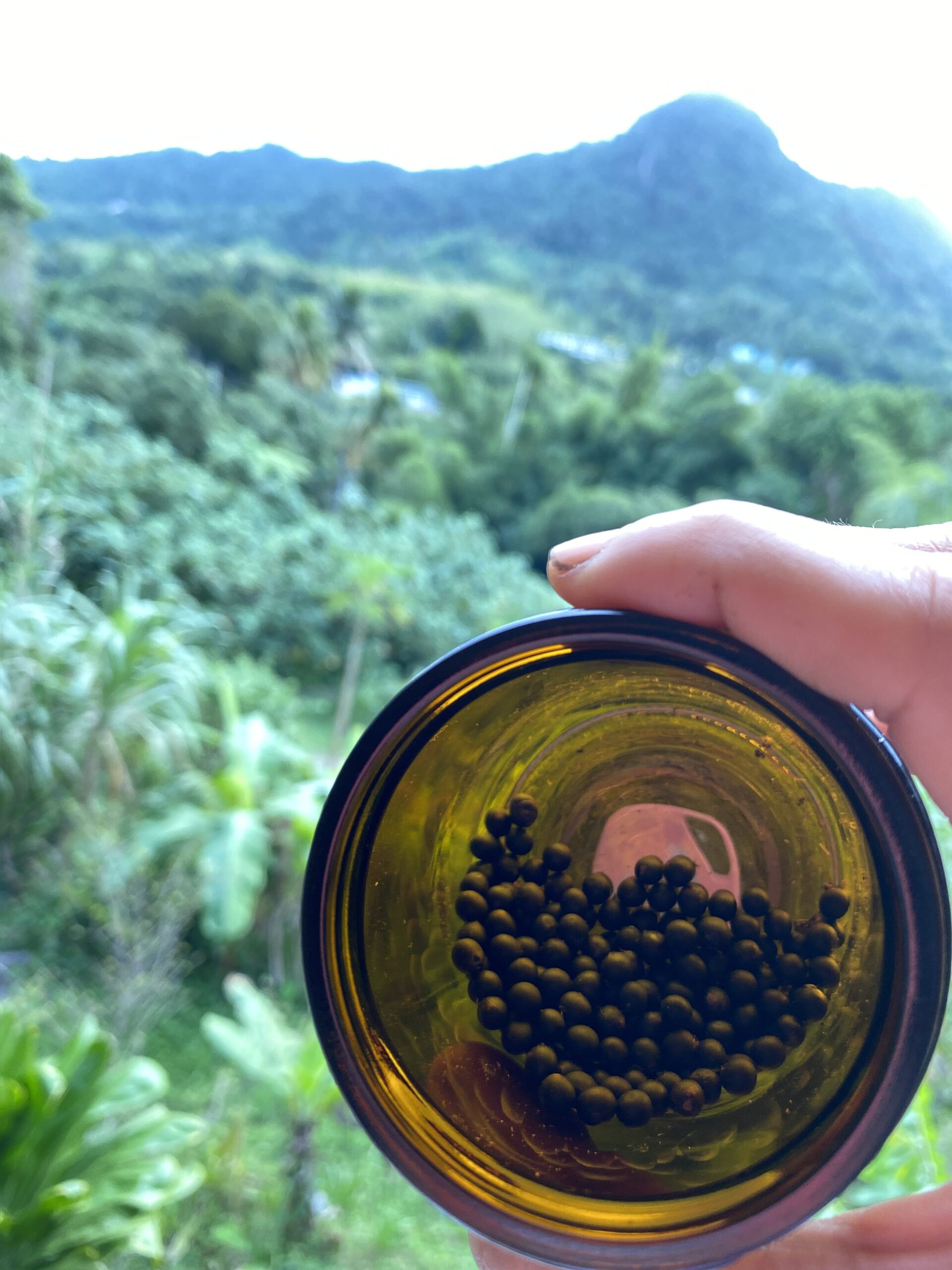Photo courtesy of the artist
About
Tara Rodríguez Besosa (she/they/ellx/bellx), born, raised and based in Borikén (Puerto Rico), lives and works at the powerful intersection of queer community, ecosystem restoration and food sovereignty. Tara shares how queer agroecological practices are essential for the transition from extractive to restorative food systems and how collective models and shared resources empower decolonized land and bodies. Tara is an interdisciplinary designer, organizer, entrepreneur, and living resource within various groups involving farming, food systems, and the arts. They have co-founded projects ranging from a DIY architect-run gallery in Brooklyn, to Puerto Rico’s Departamento de la Comida, arts venues like El Local en Santurce, and the collective queer land project OtraCosa. Their time is spent on a beautiful spectrum: some days they work with land, meditate in the forest, swim in the warm waters of the Caribbean, and exchange plant knowledge; other days are quite different: they are found on the computer writing federal grants, co-running a non-profit organization, guest lecturing for a design school or public speaking event. It is with these tools that Tara is able to collaborate with her communities of humans, activists, plants, and forests. They have recently been deepening their practice on land with non-human ecosystems, learning about the Rights of Nature and our role as human healers. They co-exist within a web of consumers, cooks, restaurants, environmental organizations, policy makers, farms, community gardens, artists, medicine makers and elders that together are decolonizing Borikén’s communities through food.
Somos OtraCosa
For the last four years, Tara has deepened their understanding of the land they live on, learning from others involved in food systems, land projects, and healing practices while living at the off grid DIY queer homestead known as OtraCosa. As part of their participation in the Fisher Lab Biennial “Common Ground”, an exchange has taken place between the occupied Munsee, Mohican, and Lenape lands of Bard College and the Hudson Valley and Taíno ancestral lands of Borikén, including visits to the Morgan Library in Manhattan, walks along the Hudson River watershed, and exchanges with queer diaspora family.
Specific sites at OtraCosa have been observed, studied, documented, and intervened as part of a deepening of relationship, collaboration and recognition with land. Tara, inspired by the Drake Manuscript, is creating their own decolonized version of a living manuscript, handmade and drawn by them, on the farm. Each site represents a small window into the much larger ecosystem this land is a part of. Understanding the food system of OtraCosa – the different human and non-human exchanges that provide nourishment, healing, and life – is an important step of a longer practice of supporting the ecosystem of this land as well as those who are in relationships with it. In the year up to the Biennale, Tara has spent time researching the different species at OtraCosa, drawing maps that begin to layer the complexities of each site, and creating a handmade walking trail taking visitors and residents of OtraCosa to various chosen sites around the land project. Most of the project will be in collaboration with others: friends/coworkers, residents of OtraCosa and its surrounding community, queer family, others within food/medicine/design/history fields.
Part of this project is the planting of Xicana Freedom Forest at OtraCosa. Xicana Freedom Forest is a living archive of trees aimed at helping communities create a future without femicide and forced migration. A mix of fruit, hardwood, and medicinal trees, this forest is designed to ensure access to food, housing, medicine, and natural migration for all people, especially survivors of gender and sexual violence. It was inspired by the feminist movement Ni Una Más, which uses pink crosses to visualize missing and murdered Indigenous women on the border between the nation-states of Mexico and the United States. Rather than carry or plant crosses in horror, grief, and protest, this forest creates sanctuary and abundance for all who enter. Xicana Freedom Forest is part of Somos Semillas Antillanas, a project of Darshan Elena Campos, one of the collaborators at OtraCosa. Over 50 mostly native trees have been grown from seed at Elena’s balcony in Cabo Rojo and brought to OtraCosa to be planted in their forever homes. The trees mark the way of the walking trail on the land at OtraCosa.
OtraCosa is an off grid DIY queer homestead in the rural mountainous community of San Salvador, Caguas. The ecosystem of OtraCosa borders Quebrada Maracal, one of various creeks found at the headwaters of The Río Grande de Loíza watershed, one of the main sources of water for the capital city of San Juan, Puerto Rico.
The Drake Manuscript lives in the 4th Floor Reading Room and archive of the Morgan Library in Manhattan, NY. It contains hand drawn and written drawings of three main themes: plants, animals of land and sea, and depictions of Indigenous life. It is one of the earliest known illustrated documents that contain plant and animal species of the Caribbean, alongside mildly understood medicinal and cultural practices of the Indigenous communities as they and the lands they lived with were being colonized.
Related
More on Tara Rodríguez Besosa:
- SOCIAL MEDIA: @BITCHIMMANOLO @ELDEPARTAMENTODELAFOOD
- El Departamento de la Comida
